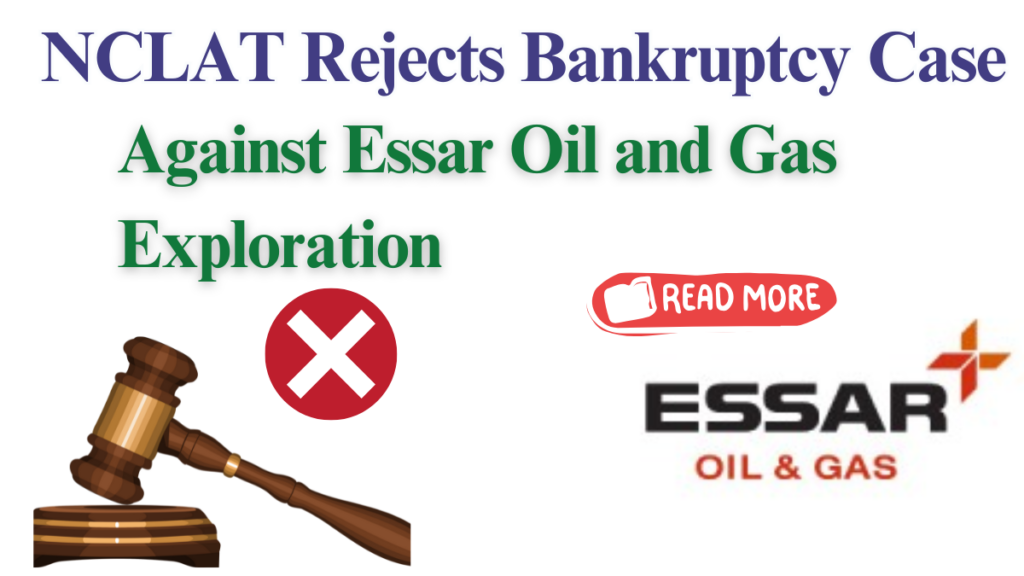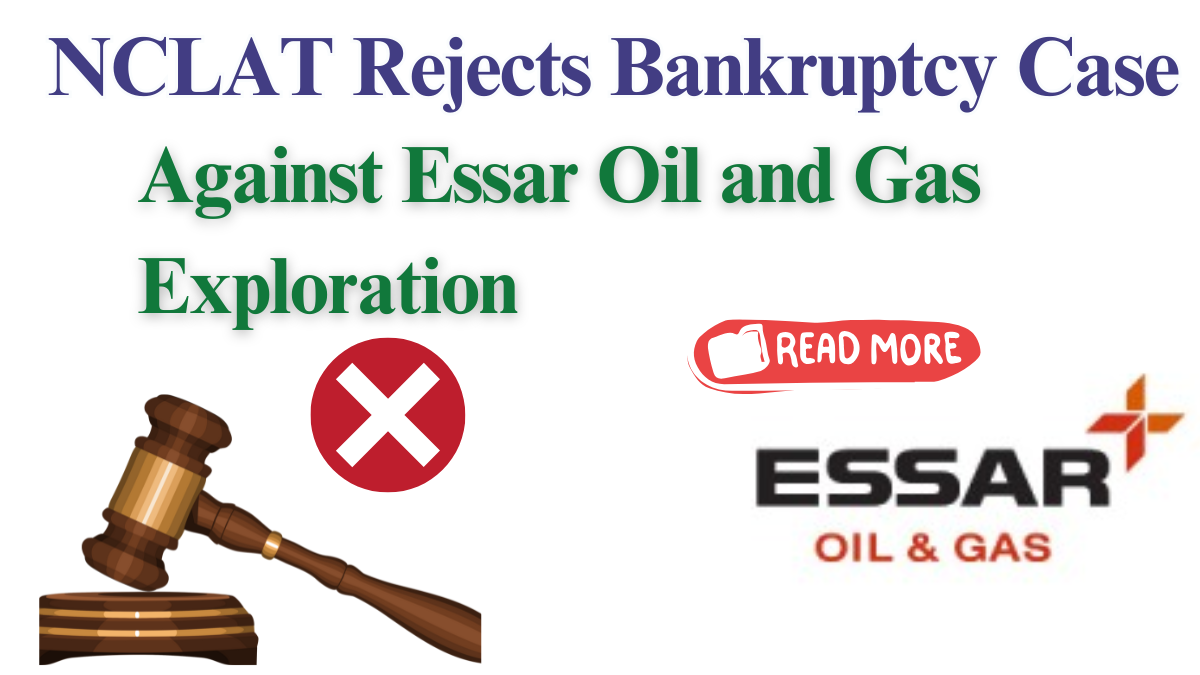In a recent landmark decision, the National Company Law Appellate Tribunal (NCLAT) overturned a bankruptcy petition against Essar Oil and Gas Exploration. The case, which was originally filed by Greka Green Solutions (India) Ltd, claimed that Essar owed the company ₹24.38 crore. The NCLAT’s ruling has significant implications for corporate insolvency proceedings in India, providing insight into how the appellate tribunal approaches bankruptcy cases and disputes over financial obligations.

Background of the Case
The case began when Greka Green Solutions (India) Ltd, a company in the business of providing environmental solutions, filed a petition before the National Company Law Tribunal (NCLT), alleging that Essar Oil and Gas Exploration had defaulted on a payment of ₹24.38 crore. The company argued that it had provided services to Essar Oil and Gas but had not received payment, and thus, Essar was liable for bankruptcy proceedings.
Following this, the NCLT issued an order admitting the petition and initiating the bankruptcy process against Essar Oil and Gas Exploration. However, Essar contested the claims and appealed the decision.
NCLAT’s Ruling
The National Company Law Appellate Tribunal (NCLAT), after reviewing the case, found that there were significant discrepancies in the petition filed by Greka Green Solutions. The NCLAT rejected the petition and dismissed the bankruptcy case against Essar, stating that the claims made by Greka Green Solutions were not substantiated in a manner that warranted the initiation of insolvency proceedings. The tribunal pointed out that the petitioner had failed to establish a legitimate default in payments or provide sufficient evidence that Essar’s financial obligations were in default.
The NCLAT’s decision was a major relief for Essar Oil and Gas Exploration, which had been facing the threat of insolvency proceedings that could potentially disrupt its business operations and affect its reputation in the market.
Why Did the NCLAT Reject the Petition?
The NCLAT found several key reasons why the petition should be dismissed:
1. Lack of Proper Evidence
The tribunal noted that Greka Green Solutions failed to provide sufficient evidence to prove that Essar Oil and Gas Exploration was indeed in default of its payments. The NCLAT emphasized that bankruptcy proceedings could not be initiated based solely on an unsubstantiated claim, particularly without a clear demonstration of default.
2. Disputed Claims
Essar Oil and Gas Exploration raised several defenses, including the argument that the amount owed to Greka Green Solutions was still under dispute. The NCLAT agreed that the nature of the financial disagreement between the two parties was not clear enough to warrant the initiation of bankruptcy proceedings.
3. Inability to Prove Corporate Insolvency
In its judgment, the NCLAT stressed the importance of proving a company’s inability to pay its debts before triggering insolvency. The tribunal stated that Greka Green Solutions had not provided sufficient grounds to prove that Essar was indeed insolvent, a key requirement for bankruptcy proceedings under Indian insolvency law.
Implications for Corporate Bankruptcy Cases in India
The NCLAT’s ruling has set a precedent for similar cases in the future. It underscores the importance of providing robust evidence when initiating bankruptcy proceedings and highlights the tribunal’s critical role in ensuring that corporate insolvency cases are only initiated in situations where a genuine default has occurred.
1. Strengthening Legal Oversight
This decision reinforces the need for thorough scrutiny in bankruptcy cases, preventing the misuse of insolvency law for non-legitimate financial disputes. The NCLAT’s ruling also stresses that insolvency proceedings should not be used as a tool for coercing settlements or resolving commercial disagreements.
2. Focus on Evidence in Insolvency Petitions
The judgment emphasizes that only legitimate claims backed by clear evidence can lead to the initiation of insolvency proceedings. Companies involved in such disputes must ensure they have adequate documentation and proof of financial default before approaching the NCLT or NCLAT.
3. Impact on Essar’s Business Operations
For Essar Oil and Gas Exploration, the dismissal of the bankruptcy petition allows the company to continue its operations without the looming threat of insolvency. This ruling is likely to reassure investors, stakeholders, and employees about the stability of Essar’s business.
Conclusion
The NCLAT’s decision to reject the bankruptcy case against Essar Oil and Gas Exploration serves as a significant reminder of the stringent requirements for initiating insolvency proceedings in India. In this case, the appeals tribunal found that the petition by Greka Green Solutions lacked sufficient evidence to support the claim of a financial default, leading to the dismissal of the bankruptcy case. This ruling not only protects Essar from insolvency proceedings but also reinforces the importance of ensuring that bankruptcy petitions are based on solid proof and legitimate financial disputes.
Frequently Asked Questions (FAQ)
1. What was the amount that Essar Oil and Gas Exploration allegedly owed?
Essar Oil and Gas Exploration was allegedly owed ₹24.38 crore by Greka Green Solutions (India) Ltd, which initiated the bankruptcy petition.
2. Why did the NCLAT reject the bankruptcy case?
The NCLAT rejected the case due to lack of sufficient evidence from Greka Green Solutions to prove that Essar was in default of its payments, along with other disputed claims regarding the financial obligations.
3. What are the implications of this ruling for other corporate insolvency cases?
The ruling highlights the importance of providing robust evidence and proves that bankruptcy proceedings cannot be initiated based on unsubstantiated claims. It also sets a precedent for future insolvency petitions in India.
4. Can a company appeal a bankruptcy ruling?
Yes, a company can appeal a bankruptcy ruling to the NCLAT, as Essar Oil and Gas Exploration did in this case, if they believe that the NCLT’s decision was unjust.
5. How does the NCLAT protect companies from wrongful insolvency claims?
The NCLAT ensures that only legitimate insolvency claims, backed by sufficient evidence and legal merit, lead to the initiation of bankruptcy proceedings. This ruling prevents companies from being wrongfully subjected to insolvency processes.
Click here to learn more.
Pari is a passionate writer known for captivating stories that blend imagination and reality. Inspired by travel, history, and everyday moments, Pari crafts narratives that resonate deeply with readers.
